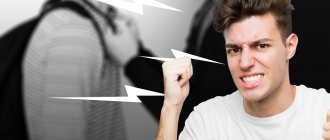Recurrent depressive disorder is characterized by repeated episodes of low mood, decreased mental and physical activity, each of which lasts from two weeks to six months (possibly more). Between episodes of depression there are periods of complete health (intermission).
Important
A person cannot work, and sometimes tries to die by any means necessary. Therefore, you need not only to consult a psychotherapist, but also to do it as soon as possible.
In the dynamics of the disease there are no manias - periods of elevated mood, as well as physical and mental activity. This distinguishes recurrent depression from bipolar disorder.
The causes of the recurrent disorder lie in the disruption of the metabolism of norepinephrine, dopamine, and serotonin, through which nerve cells—neurons—carry out impulses and transmit information. The cause of these violations has not been established. Evidence was obtained of the genetic causes of the disease, the theory of damage at the neuron level with the formation of foci of activity similar to epilepsy, and the theory of disturbances in the rhythms of sleep and wakefulness.
Symptoms and signs of recurrent depressive disorder
The psychotherapist assesses the severity of the manifestations of the current episode and determines the degree of its severity.
With a mild degree of severity, the patient can still perform social functions - work, maintain social connections, run a household. Moderate severity makes it difficult to do this; performance, motor and mental activity are limited. In severe cases, even basic needs are met with difficulty - the person does not get out of bed, does not eat or drink, and the risk of suicide is maximum.
During each relapse of depression, the patient may experience the following symptoms:
- poor ability to concentrate - patients have difficulty making decisions and taking responsibility, both large-scale (production, personal) and minimal (what to wear, what to eat);
- negative assessment of the past, present and, especially, the future;
- feeling of hopelessness - may become dull during the day due to the fact that the patient is distracted by everyday activities and is temporarily not fixated on negative emotions and thoughts;
- decreased or increased appetite;
- insomnia with early awakening and inability to fall back to sleep or increased sleepiness, when the patient wakes up sleep-deprived and constantly wants to sleep, regardless of the time and quality of sleep;
- general lack of vital energy and strength;
- decreased self-confidence, self-esteem;
- decreased sex drive.
The diagnosis of recurrent depressive disorder is carried out by a psychotherapist or psychiatrist together with a clinical psychologist.
Recurrent depressive disorder meets the criteria for classic depression. It is based on the depressive triad, which was put forward by the German psychiatrist Emil Kraepelin at the turn of the 19th and 20th centuries:
- Decreased mood.
- Decreased physical activity.
- Slowing down of mental activity.
These signs should significantly affect the patient's personal and professional life.
What you need to know about recurrent depression
Cases of “very rapid depression” have been described in psychiatric practice since the mid-19th century, but recurrent depression was recognized as a separate disease only in 1992 and included in ICD-10.
The fact is that women are more susceptible to transient depression, and for a long time the development of the disease was associated with PMS. As psychopathology was studied, premenstrual depression was identified as a recurrent subtype.
Today, cyclical depression is increasingly observed in men, which in most cases is associated with excessive stress on the psyche caused by the rhythm of modern life.
Cases of recurrent depression often occur in adolescents, which carries a double danger, since in adulthood there is a risk of the disorder developing into bipolar disorder.
Self-medication can cause irreparable harm to mental health, as well as the lack of proper treatment, so if symptoms of the disease appear, it is better to consult a doctor.
Melancholic and anxious depression
In classical psychiatry, it is customary to distinguish melancholic and anxious depression, although the disorder is not limited to these forms.
Melancholic depression is the most severe form. Patients experience “vital” melancholy - it is described as physical pain in the soul, chest, neck, head. A person lies in bed for days facing the wall, stops talking and caring for himself. Nothing brings pleasure, even what he used to love very much. They have persistent thoughts of suicide, which are prevented from being realized only by a general loss of strength.
Important
Suicidal thoughts and intentions can be hidden from others, so depression requires the supervision of an experienced psychotherapist.
Anxious depression is expressed in hypochondriacal ideas (premonitions of non-existent diseases), anxiety due to negative future scenarios, pronounced vegetative-somatic manifestations - palpitations, chills, cold sweats, digestive disorders.
Reasons for development
People with this type of depression also have biological prerequisites for the development of this condition - a low level of production of mood hormones is detected, and disturbances in neural communication such as epilepsy may also be observed. Organic disruptions in the rhythms of sleep and wakefulness are characteristic. A possible cause of such disorders is a genetic or hereditary predisposition to affective disorders.
Provoking and predisposing factors include:
- presence of a depressive diagnosis in close relatives;
- addiction to alcoholic beverages or toxic drugs;
- severe emotional shock (the so-called “incomplete grief reaction”);
- traumatic brain injury;
- severe and long-term somatic diseases;
- intoxication of the body.
The onset of the disease is often based on an external provoking stressful or emotionally difficult situation. Subsequent episodes arise independently, that is, they no longer necessarily involve the presence of some kind of life troubles.
Recurrent depression has a favorable prognosis, but only if you seek professional help from a psychiatrist. Independent attempts to cope with the disease only worsen the condition and can lead to suicidal thoughts.
Diagnosis of recurrent depressive disorder
The diagnosis is made by a psychotherapist or psychiatrist. To confirm the diagnosis it is necessary:
- Clinical and anamnestic examination - the doctor identifies the patient’s symptoms and collects detailed information about his life.
- Pathopsychological examination - performed by a clinical psychologist; it evaluates personal characteristics and describes deviations in thinking, attention, memory, and motivation.
- Consultation with a candidate or doctor of sciences, a consultation of specialists - in complex cases when the symptoms are difficult to treat or the diagnosis is in doubt.
- Laboratory and instrumental methods for diagnosing the disorder have not yet been developed.
To exclude organic and endogenous diseases (schizophrenia, schizotypal disorder) and prescribe adequate therapy, Neurotest, Neurophysiological test system, and EEG are used.
Consequences of untreated recurrent depression
The disease is dangerous due to its transience and cyclical nature. During an exacerbation, a person is often so weak that he is unable to see a doctor, and after his condition improves, he does not consider it necessary to do so.
Relapses literally exhaust a person physically and emotionally. With each new episode, cognitive functions, performance, immunity decrease, and interpersonal and social communication worsens. Against the background of changes in psycho-emotional state, the endocrine and cardiovascular systems suffer. In 2% of people suffering from recurrent depression, another relapse ends in suicide.
It is necessary to treat recurrent depressive disorder, but after finding out the cause of its occurrence. This should be done by an experienced psychiatrist.
Treatment of depression
As in the treatment of any other neurotic disorder, in the case of depression, an integrated approach is used, including psychotherapeutic and medicinal techniques. If the situation is not advanced, then the chances of avoiding the use of medications are quite high.
Non-drug treatments
Prevention and self-help methods
Awareness, lifestyle and state of a person’s psyche are the components that significantly affect his ability to withstand stress factors and independently prevent the development of such conditions. Depression is often called a disorder of infantilism, to prevent which it is necessary to accept the fact that each of us is responsible for our own condition, and we can choose to be happy or unhappy. As soon as the patient manages to accept responsibility for himself and his condition, depression recedes by itself.
Psychotherapy for depression
The primary task of psychotherapy is to help a person realize that he himself has led himself into depression. One of the popular methods is “drawing”. The patient is asked to draw exactly what his depressed mood looks like (it can be visualized as a closet, a door to nowhere, a black hole and other images). And then decide for himself where he wants to go. Whether he goes into the black hole or not is his choice. A depressed mood essentially does not happen on its own, and it was not the world that led a person to depression - all these realizations are made with the help of a specialist. The next known method is to help the patient maintain social status and everyday activities. The therapist usually works on a program to create automatic actions to return to normal life: get yourself in order, go to the gym, meet friends, cook food. Sometimes the patient cannot and does not want to perform these simple ordinary manipulations, but they trigger physiological processes in the body that contribute to the production of the hormone serotonin and the establishment of chemical processes.
Types of psychotherapy
- Cognitive - behavioral
- changing the initial incorrect attitudes that led to destruction. - Interpersonal
– changing the patient’s perception and style of communication with other people. Determines the form of a person’s social participation in society. - Psychodynamic
. Defines intrapersonal conflict as the root cause and is aimed at resolving it by bringing it to the plane of consciousness.
Treatment of depression with folk remedies
At certain unadvanced stages, in addition to psychotherapeutic methods, you can use herbal medicine; it certainly won’t make you worse. Still, the wisdom of centuries does not pass without a trace, and it is worth noting that our ancestors did not particularly suffer from neuroses. Herbal medicine, indeed, offers a large number of natural preparations that have a general strengthening effect on humans.
So, as we have found out, a depressive state is largely caused by disturbances in the functioning of the brain, which requires vitamins, microelements, proteins and amino acids to nourish it. Most of these important substances are found in herbal preparations such as St. John's wort, Chinese lemongrass, chamomile, oregano root, lavender flowers and many others. These herbs can be used in the form of tinctures and decoctions, either individually or in combination. Another excellent remedy is evening soothing baths with the addition of string or myrtle flowers. By the way, many of these products are sold in pharmacies and cosmetic stores in a form ready for use.
Remember that lifestyle and a healthy, balanced diet, including fruits, vegetables and grains, are also an excellent method for preventing stress and depression.
Drug therapy
If all the proposed methods do not have the desired effect or the stage is already quite advanced (major depressive or bipolar disorder), then a course of medications cannot be avoided. Only a specialist can prescribe antidepressant drugs. At a certain stage of leveling, you can stop taking medications, but to get out of the peak, if it has occurred, you need to start with them. In severe cases, medications serve as an auxiliary remedy, but not the main one, this must be remembered.
What medications are prescribed for depression?
Antidepressants
essentially stabilize the content of neurotransmitters in the brain, thereby improving mood. Unlike benzodiazenin tranquilizers (Phenazepam, Relanium, Elenium, Valocordin), antidepressants do not become addictive and do not develop withdrawal symptoms. The most popular today: “Imipramine”, “Anitriptyline”, “Attarax” and many others. There is no point in covering the full spectrum here, since the prescription of a medicine can only be carried out by the attending physician. Taking medications on your own can be extremely dangerous. All medications can cause side effects, and many require restrictions on diet or other medications.
Stages of depression
Like many psychopathic conditions, depression has certain stages of development.
- The first stage is called denial, and at this stage the person continues to live a normal life, as if nothing had happened. For example, in the event of the loss of a loved one, in denial it is common to talk about them in the present tense, to keep their things and photographs, as if this person is about to return. In general, the patient is unable to accept reality due to the activation of compensatory mental mechanisms.
- At the second stage, along with the understanding that it is pointless to deny what happened, feelings of resentment and anger come. Often, the patient begins to look for those to blame for what happened and throw out his negative emotions on them.
- The third stage is called “bargaining,” at which the negativity is dulled, and the person begins to look for ways to get out of this state, listens to loved ones, and goes to a specialist if necessary. In general, they are trying to correct the situation.
- And only at the fourth stage does “depression” itself come, as it is. This is the most dangerous period, because in it a person begins to fully understand the situation and falls into despair, called depression. The pain during this period is felt in full force.
- The final stage is acceptance, at which comes the realization that the past must be left in the past. Many begin to look at their lives and loved ones in a new way, finding solace in family or work. Having gone through all the previous stages, a person accepts life as it is, realizing that fighting what cannot be corrected is pointless.











